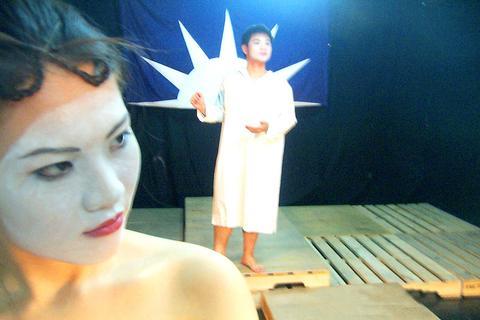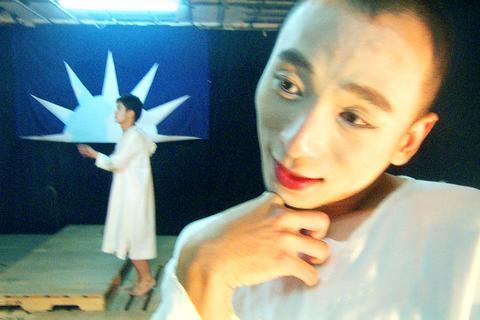The Old China Soul of Lun Yu by Critical Point Theater promises to leave you scratching your head as it asks the questions no one dares ask, not the least of which is: "Did Confucius really never pass wind?"
This month's production is partly a tribute series to the late screenwriter Tien Chi-yuan (田啟元). Tien founded Critical Point Theater in 1988 and wrote and directed Old China as the group's premier piece, audaciously celebrating the then-recent lifting of martial law with the first play written and performed in Taiwan to deal with issues of homosexuality. Tien passed away in 1996 after a battle with AIDS.

PHOTO COURTESY OF CRITICAL POINT THEATER
Jan Hueiling (詹慧玲), president of Critical Point Theatre and director of this month's production, said he hoped the shows could give audiences a taste of the not-too-distant past, when the idea of challenging authority had just been given wings in Taiwan.

PHOTO COURTESY OF CRITICAL POINT THEATER
The script of Old China draws heavily from the Lun yu (論語), or Confucian Analects. Interspersing excerpts from the Analects with off-the-wall dialogue, Old China turns "Chinese way of thinking" on its head with the goal of revealing how the powerful have manipulated the legacy of Confucius throughout history to oppress the people, specifically homosexuals.
While it is Chinese tradition that is the main focus of Old China, the six characters are done up to resemble members of a chorus in the style of an ancient Greek tragedy. The cast, made up of two women and four men, wear white robes and red silk scarves, with their faces are painted white.
The stage is set up in the center of the auditorium, approximating the shape of a T and painted with what appear to be sperm of various colors on a black background. The audience members sit on stools surrounding the stage but are encouraged to get up and move around to watch the process from different angles.
While the script lacks a plot, the dramatic intensity increases as the action moves from measured dialogue to the dramatic re-telling of a classic homosexual love story to a rapid-fire debate. These three phases are divided by two sessions of abstract movement brought on
suddenly by loud music, which is alternately reminiscent of Chinese communist propaganda films and kung-fu flicks.
Asked later if the complicated and abstract movements in these sessions might overwhelm the viewer, director Jan said they were no more complicated than the multitude of information we process each moment. The movements are not intended to frustrate the viewer, but rather to play off the personality of each character.
Yet the characters' personalities are perhaps the most frustrating aspect of the play. Each of the six seems to be assigned a certain trait: loud-mouthed, cynical, insecure, delicate, etc. Yet the frequent interspersion of highly formal, Beijing opera-style dialogue and the lack of realistic human interaction between characters alienate the viewer and severely limit the possibility of identification.
Only the male character in the cut-sleeve robe played by David Cheng (鄭大偉) seems fully human. His character is an an allusion to the famous story of the emperor who cut off his sleeve to avoid waking his boyfriend who was sleeping upon it. Cheng maintains a sense of dignity and realism, despite the chaos around him.
Yet a degree of confusion is intended. As Tien stresses in his forward on the original 1988 program (copies of which are provided to the audience): the goal of Old China is to question the nature of questioning itself.
Performance notes:
What: The Old China Soul of Lun Yu
Who: Critical Point Theatre (
Where: Huashan Cultural and Creative Industry Center, Fruit Wine Building, 2nd Floor (
When: Tonight, Saturday and Sunday at 7:40pm
Tickets: NT$300, available online or by phone (www.artsticket.com.tw or 02-2553-4493), or at the door.

On April 26, The Lancet published a letter from two doctors at Taichung-based China Medical University Hospital (CMUH) warning that “Taiwan’s Health Care System is on the Brink of Collapse.” The authors said that “Years of policy inaction and mismanagement of resources have led to the National Health Insurance system operating under unsustainable conditions.” The pushback was immediate. Errors in the paper were quickly identified and publicized, to discredit the authors (the hospital apologized). CNA reported that CMUH said the letter described Taiwan in 2021 as having 62 nurses per 10,000 people, when the correct number was 78 nurses per 10,000

As we live longer, our risk of cognitive impairment is increasing. How can we delay the onset of symptoms? Do we have to give up every indulgence or can small changes make a difference? We asked neurologists for tips on how to keep our brains healthy for life. TAKE CARE OF YOUR HEALTH “All of the sensible things that apply to bodily health apply to brain health,” says Suzanne O’Sullivan, a consultant in neurology at the National Hospital for Neurology and Neurosurgery in London, and the author of The Age of Diagnosis. “When you’re 20, you can get away with absolute

May 5 to May 11 What started out as friction between Taiwanese students at Taichung First High School and a Japanese head cook escalated dramatically over the first two weeks of May 1927. It began on April 30 when the cook’s wife knew that lotus starch used in that night’s dinner had rat feces in it, but failed to inform staff until the meal was already prepared. The students believed that her silence was intentional, and filed a complaint. The school’s Japanese administrators sided with the cook’s family, dismissing the students as troublemakers and clamping down on their freedoms — with

As Donald Trump’s executive order in March led to the shuttering of Voice of America (VOA) — the global broadcaster whose roots date back to the fight against Nazi propaganda — he quickly attracted support from figures not used to aligning themselves with any US administration. Trump had ordered the US Agency for Global Media, the federal agency that funds VOA and other groups promoting independent journalism overseas, to be “eliminated to the maximum extent consistent with applicable law.” The decision suddenly halted programming in 49 languages to more than 425 million people. In Moscow, Margarita Simonyan, the hardline editor-in-chief of the